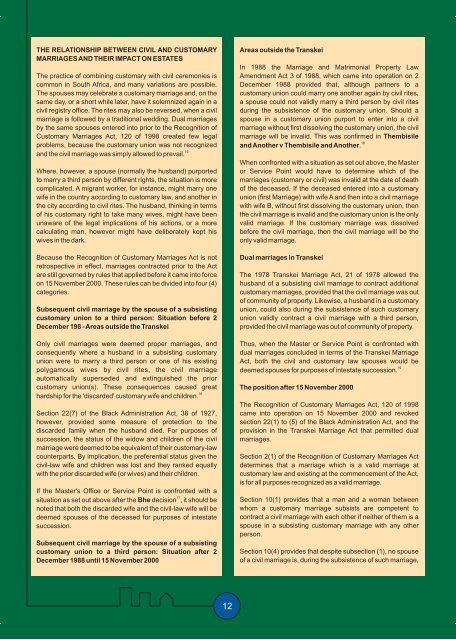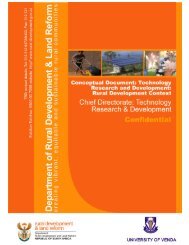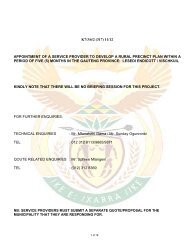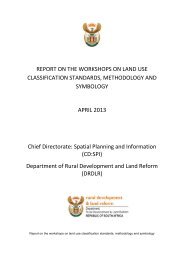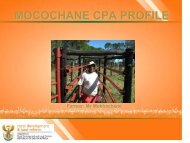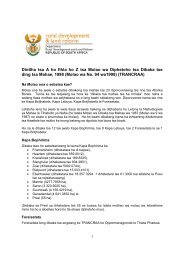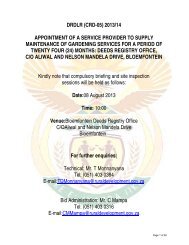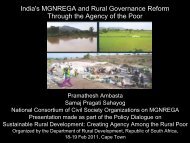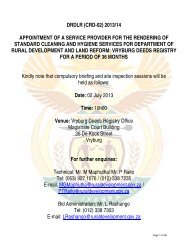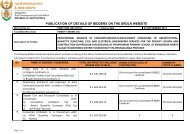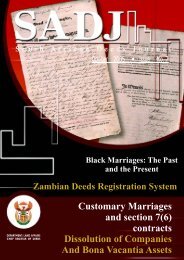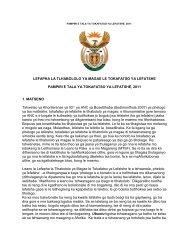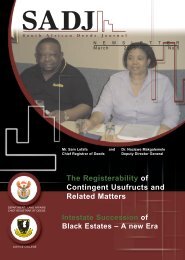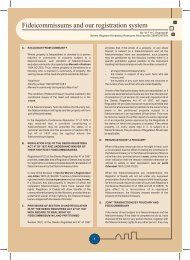South African Deeds Journal
South African Deeds Journal - Department of Rural Development ...
South African Deeds Journal - Department of Rural Development ...
- No tags were found...
Create successful ePaper yourself
Turn your PDF publications into a flip-book with our unique Google optimized e-Paper software.
THE RELATIONSHIP BETWEEN CIVIL AND CUSTOMARY<br />
MARRIAGES AND THEIR IMPACT ON ESTATES<br />
The practice of combining customary with civil ceremonies is<br />
common in <strong>South</strong> Africa, and many variations are possible.<br />
The spouses may celebrate a customary marriage and, on the<br />
same day, or a short while later, have it solemnized again in a<br />
civil registry office. The rites may also be reversed, when a civil<br />
marriage is followed by a traditional wedding. Dual marriages<br />
by the same spouses entered into prior to the Recognition of<br />
Customary Marriages Act, 120 of 1998 created few legal<br />
problems, because the customary union was not recognized<br />
15<br />
and the civil marriage was simply allowed to prevail.<br />
Where, however, a spouse (normally the husband) purported<br />
to marry a third person by different rights, the situation is more<br />
complicated. A migrant worker, for instance, might marry one<br />
wife in the country according to customary law, and another in<br />
the city according to civil rites. The husband, thinking in terms<br />
of his customary right to take many wives, might have been<br />
unaware of the legal implications of his actions, or a more<br />
calculating man, however might have deliberately kept his<br />
wives in the dark.<br />
Because the Recognition of Customary Marriages Act is not<br />
retrospective in effect, marriages contracted prior to the Act<br />
are still governed by rules that applied before it came into force<br />
on 15 November 2000. These rules can be divided into four (4)<br />
categories.<br />
Subsequent civil marriage by the spouse of a subsisting<br />
customary union to a third person: Situation before 2<br />
December 198 - Areas outside the Transkei<br />
Only civil marriages were deemed proper marriages, and<br />
consequently where a husband in a subsisting customary<br />
union were to marry a third person or one of his existing<br />
polygamous wives by civil rites, the civil marriage<br />
automatically superseded and extinguished the prior<br />
customary union(s). These consequences caused great<br />
16<br />
hardship for the 'discarded' customary wife and children.<br />
Section 22(7) of the Black Administration Act, 38 of 1927,<br />
however, provided some measure of protection to the<br />
discarded family when the husband died. For purposes of<br />
succession, the status of the widow and children of the civil<br />
marriage were deemed to be equivalent of their customary-law<br />
counterparts. By implication, the preferential status given the<br />
civil-law wife and children was lost and they ranked equally<br />
with the prior discarded wife (or wives) and their children.<br />
If the Master's Office or Service Point is confronted with a<br />
17<br />
situation as set out above after the Bhe decision , it should be<br />
noted that both the discarded wife and the civil-law wife will be<br />
deemed spouses of the deceased for purposes of intestate<br />
succession.<br />
Subsequent civil marriage by the spouse of a subsisting<br />
customary union to a third person: Situation after 2<br />
December 1988 until 15 November 2000<br />
Areas outside the Transkei<br />
In 1988 the Marriage and Matrimonial Property Law<br />
Amendment Act 3 of 1988, which came into operation on 2<br />
December 1988 provided that, although partners to a<br />
customary union could marry one another again by civil rites,<br />
a spouse could not validly marry a third person by civil rites<br />
during the subsistence of the customary union. Should a<br />
spouse in a customary union purport to enter into a civil<br />
marriage without first dissolving the customary union, the civil<br />
marriage will be invalid. This was confirmed in Thembisile<br />
18<br />
and Another v Thembisile and Another.<br />
When confronted with a situation as set out above, the Master<br />
or Service Point would have to determine which of the<br />
marriages (customary or civil) was invalid at the date of death<br />
of the deceased. If the deceased entered into a customary<br />
union (first Marriage) with wife A and then into a civil marriage<br />
with wife B, without first dissolving the customary union, then<br />
the civil marriage is invalid and the customary union is the only<br />
valid marriage. If the customary marriage was dissolved<br />
before the civil marriage, then the civil marriage will be the<br />
only valid marriage.<br />
Dual marriages in Transkei<br />
The 1978 Transkei Marriage Act, 21 of 1978 allowed the<br />
husband of a subsisting civil marriage to contract additional<br />
customary marriages, provided that the civil marriage was out<br />
of community of property. Likewise, a husband in a customary<br />
union, could also during the subsistence of such customary<br />
union validly contract a civil marriage with a third person,<br />
provided the civil marriage was out of community of property.<br />
Thus, when the Master or Service Point is confronted with<br />
dual marriages concluded in terms of the Transkei Marriage<br />
Act, both the civil and customary law spouses would be<br />
19<br />
deemed spouses for purposes of intestate succession.<br />
The position after 15 November 2000<br />
The Recognition of Customary Marriages Act, 120 of 1998<br />
came into operation on 15 November 2000 and revoked<br />
section 22(1) to (5) of the Black Administration Act, and the<br />
provision in the Transkei Marriage Act that permitted dual<br />
marriages.<br />
Section 2(1) of the Recognition of Customary Marriages Act<br />
determines that a marriage which is a valid marriage at<br />
customary law and existing at the commencement of the Act,<br />
is for all purposes recognized as a valid marriage.<br />
Section 10(1) provides that a man and a woman between<br />
whom a customary marriage subsists are competent to<br />
contract a civil marriage with each other if neither of them is a<br />
spouse in a subsisting customary marriage with any other<br />
person.<br />
Section 10(4) provides that despite subsection (1), no spouse<br />
of a civil marriage is, during the subsistence of such marriage,<br />
12


